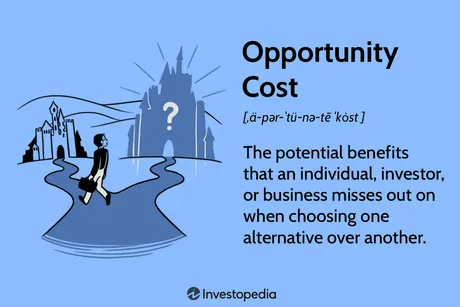
Risk vs Reward
There's this thing with investing called opportunity cost. The premise is pretty simple. If we take zero risks then we are guaranteed to get zero reward. If all of our value is stored within something stable like USD we are not going to lose any money (assuming USD is our unit-of-account), but we are also not going to make any money either.
The problem with USD, and every other fiat currency on the planet, is that we all know they are designed to lose at least 2% of their value every year on average. Many would argue that it's much more than that in the current environment, but we can't be sure one way or another because of the cyclical nature of the economy. We won't be able to measure inflation until we get back to a part of the cycle that is similar to what it was before all the prices started increasing (easy money and low fund rate). But I digress.
Traditionally opportunity cost is a basic comparison between two financial decisions. On one hand, we have the financial decision that we actually made, and on the other hand we have a second financial decision that would have been better in retrospect. It is in this way that opportunity cost is something that we all have to deal with all the time because it is simply not possible to make the best investment decisions consistently on a day to day basis.
Say we bought Amazon stock instead of Apple stock and Apple outperformed Amazon. That's an opportunity cost. Say the bear market hits and we're forced to sell Bitcoin at the bottom to pay bills. This is also an opportunity cost. Basically every financial decision we ever make in our entire lives will be an opportunity cost because there's always something that could have been done better in retrospect.

So where do we draw the line?
This is a very important question that needs answering. If I buy Bitcoin on the spot market and then Bitcoin goes x10, I could have always made more money within a futures market trading on leverage. Does that mean the correct move is always to trade like a degenerate psychotic madman? Only if we know for sure what the price is going to do in the future. The problem with knowing the future is that it is often called "insider trading" and is a felony white-collar crime. Oops.
Dollar Cost Averaging (DCA)
Many financial experts will tell us that we should always enter and exit the crypto market slowly to lower our exposure to volatility. DCA strategy is always an opportunity cost because no matter what happens it means we're going to be buying/selling at inopportune times based on whatever interval we picked. Again, something being an opportunity cost doesn't actually mean it's a bad decision, only that we might feel that way in retrospect after everything is said and done.
Impermanent Losses (IL)
When DEFI 2020 rolled around a new financial term was coined called Impermanent Losses. That's because protocols like Uniswap force liquidity providers to post all their collateral for sale at the current price using a sliding scale to manipulate the ratio. What had happened was that some of these DEFI tokens would make crazy gains like x100 and the liquidity providers were angry because their LP positions were only up x10. Where did the money go?
Turns out being an LP is exactly the same as DCA trading strategy. It lowers risk but it also lowers the reward. Because crypto users are complete degenerates they call this an "opportunity cost" and "a loss". It is not a loss, but simply a safer and less volatile way to play the crypto game (the most volatile/risky game there is). To call that a loss or a bad play is often akin to not understanding proper gambling strategy and hedging techniques.
Meme Coins
There's a moon monster on Solana called $WIF that's been getting a lot of attention lately. It's gone more than 10x over the last few months. WIF is short for 'dog with hat' or 'dog wif hat'. It's really stupid and people are obsessed with it. It's actually kind of enraging honestly seeing a meme coin on a VC chain get into the top 100 while Hive struggle-buses at #350, but it is what it is.
Point here being is that opportunity cost can also be linked to survivorship bias in this way. Degenerates see a meme coin like WIF take off and assume that the right gambling strategy is to ape in on meme coins even though most of them just crash to zero immediately. This tendency to focus on the lottery winners and try to mimic their behavior when all they did was get lucky can get us into a lot of trouble.

HBD conversions
My final example for opportunity cost is a psychological pattern I've noticed when converting HBD into Hive over the 3.5 day price feed average. For simplicity, let's say we are converting 100 HBD into Hive and Hive currently sits at a value of $1, so both HBD and Hive are the same $1 price.
We would expect this conversion to give us $100 worth of Hive which is 100 Hive at that price. However, what would happen if the price of Hive went down to $90 during that time? Now we would expect to get more than 100 Hive because we were promised $100 worth of Hive and the value of Hive has gone down to 90 cents. Now we are expecting 111 Hive instead of 100.
The problem with this logic is that if the price went down gradually and evenly from $1 to 90 cents then the AVERAGE over the 3.5 days is going to be 95 cents. Instead of getting 111 Hive we'll end up with 105 Hive and feel like we got ripped off. After all we could have just waited 3.5 days and traded that HBD on the internal market to get the 111 Hive.
Now if we look at the other direction Hive price could go up to $1.10. In this case the average will be $1.05 cents and we will only receive 95 Hive when we could have potentially sold on the internal market 3.5 days ago to get 100 Hive. Again, we will feel like we got ripped off, so no matter what the price does we're going to feel like we got the short end of the stick when it comes to HBD conversions.
The reason for this mentality is that our brain is going to constantly trick us into thinking we took an unreasonable opportunity cost when that's actually not what happened in reality. This is due to trading on the average just like impermanent losses and DCA strategy.
When the price goes down and we get more Hive than we expected we tell ourselves we should have just waited the 3.5 days and traded on the internal market. When the price goes up and we get less Hive than expected we tell ourselves we should have traded on the internal market instantly for the 100 Hive.
Again, no matter what happens, we will do mental gymnastics and think of all the things we could have done in retrospect that would have turned out to be a better move. This is an extremely toxic way to think, and everybody does it due to it being the normal evolutionary process of trying to make better decisions. It just doesn't apply to finance and statistical mathematics very well where everything is a completely random-chance event. Real life is often much less random than market psychology and therefore this strategy tends to work out pretty well in other situations.
This is why being a professional gambler is so difficult.
Because the realized outcome of any particular event doesn't matter. What matters is the estimated value (EV) of the current decision we are making. We don't know what the future will be and so the decisions we make today have to be based on a full spectrum of all possible outcomes.
The EV is calculated by adding up everything that could happen and aggregating it into an average. Whichever decision has the highest EV is the one that should be picked, regardless of how is actually turns out later. If we get the best hand in poker and go all in and lose, that was still the best possible play to make on the average and should be executed that way every time no matter what actually happens in the moment. It's an extremely difficult way to make decisions which is why some of us can get a major edge against other competitors.
Conclusion
The grass is always greener on the other side. The psychology of the human mind is often rooted in scarcity, fear, and doubt. It takes a lot of self-improvement and discipline to overcome these hurdles, but it's worth it in the end.
Return from Opportunity Cost to edicted's Web3 Blog
